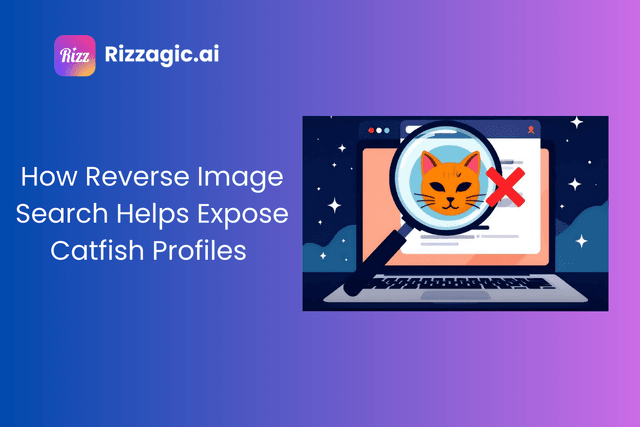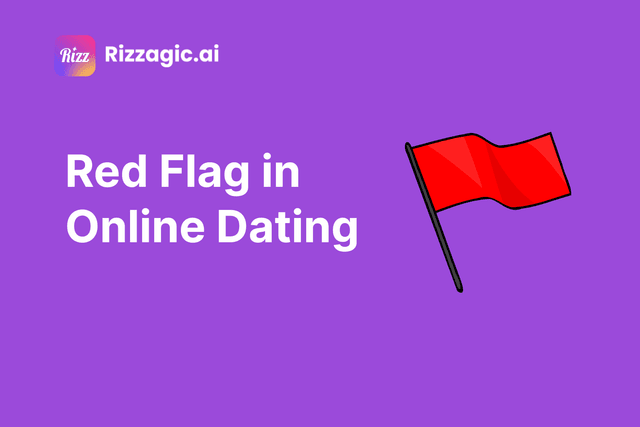- Home
- >
- Blog
- >
- Dating Safe
- >
- Article Details
How to Spot a Catfish with a Dating Photo Image Search
You just matched with someone who looks perfect — charming smile, flawless photos, quick replies. But something feels off. Their story shifts, their socials seem new, and every picture looks too good.
That’s how modern catfishing works. With AI-generated faces and stolen photos, fake profiles look more real than ever.
Before you trust your gut, trust a tool.
Rizzagic’s Dating Photo Image Search helps you trace where a photo came from, see if it’s reused elsewhere, and even detect AI-made fakes — so you catch the lie before you catch feelings.
Why Catfishing Still Works — and Why Photos Are Key
Catfishing still works because people want to believe in connection. Scammers know that — and they use it. Today’s fake profiles aren’t sloppy collages anymore. They use AI-generated faces, stolen influencer photos, and even deepfaked selfies that look alarmingly real.
Most of us judge a match by pictures first. A few great photos can build instant trust — and that’s exactly why scammers rely on them. They know you’ll scroll, not investigate.
That’s why photos are the catfish’s strongest weapon — and your best clue. A single reverse image search can reveal if that “perfect” face appears on multiple dating apps, in stock photo databases, or on someone else’s account. One quick check can save you from weeks of emotional manipulation.
Step-by-Step: How to Reverse Search a Dating Photo
Step 1. Save the photo that feels off
Pick the clearest image — ideally a selfie or profile photo. Avoid screenshots full of chat bubbles; the cleaner the image, the better the match results.
Step 2. Run a reverse image search
You could upload it to Google or Yandex, but those tools mostly surface public websites. For dating-specific results, use Rizzagic’s Dating Photo Image Search — built to scan social profiles, dating platforms, and hidden duplicates that generic engines miss.
Step 3. Review the matches
If the same face appears under different names or countries, that’s a red flag. If it shows up on modeling sites, ads, or stock-photo libraries, it’s almost certainly fake.
Because catching a catfish shouldn’t take weeks of guessing — just one smart photo check.
Real Signs You’re Dealing with a Catfish
Spotting a fake dating profile isn’t always easy — catfishers have learned how to look real. But their stories, photos, and timing often give them away. Here are the most common catfish signs to watch for before you get emotionally invested:
Behavioral Red Flags
🚩 Too perfect, too fast.
They call you “the one” within days or push for emotional closeness before meeting.
🚩 Endless excuses.
Their camera is “broken,” they’re “traveling,” or suddenly can’t video chat.
🚩 Location mismatch.
Their dating profile says one city, but their messages come from a totally different time zone.
🚩 Money or help requests.
The moment someone asks for financial help, gift cards, or crypto — it’s a scam.
Visual & Photo Clues
🚩 Stock-quality pictures.
Overly lit, symmetrical faces and blurred backgrounds often mean the photo was stolen or AI-generated.
🚩 No normal photos.
No group pics, no candid shots, just a few “perfect” selfies — classic catfish behavior.
🚩 Reused images.
A reverse image search can reveal if their dating photo appears on multiple apps or even model websites.
What to Do If You Found a Fake
Realizing your match is a catfish can sting — but the faster you act, the more control you keep.
- Stop engaging immediately
Don’t argue, confront, or share more info. Catfishers thrive on emotional reactions.
- Take screenshots
Save photos, usernames, and chat logs. They’re proof if you report or need to trace the account later.
- Report the profile
Most dating apps have quick “Report” or “Block” buttons. Include evidence of reused or stolen photos.
- Check if your own images were stolen
Run your selfies through Rizzagic’s Reverse Image Search to see if someone’s impersonating you.
- Protect your accounts
Update passwords, especially if you’ve shared your email or phone number.
💡 Pro Tip: If the same fake account appears on multiple platforms, it’s not coincidence — it’s automation. Rizzagic can flag and track those duplicates across networks.
Protect Yourself Before You Match
The best way to avoid being catfished is to stay one step ahead. Small precautions make a big difference in online dating safety.
- Do a photo check first.
Before you get too attached, upload their image to Rizzagic’s Dating Photo Image Search — you’ll instantly see if that face exists elsewhere online.
- Look for context, not perfection.
Real people have variety: candid photos, group shots, and unpolished moments.
- Don’t overshare.
Keep personal info (address, job, daily routines) private until trust is built offline.
- Always video chat before meeting.
A 30-second call can save you weeks of wasted emotion.
- Protect your own images.
Avoid posting ultra-high-res selfies that scammers can reuse for fake profiles.
✅ Remember: Real connection comes with transparency. If someone dodges every attempt at verification, that is your answer.
Frequently Asked Questions
1. How accurate is Rizzagic’s Dating Photo Image Search?
Rizzagic uses advanced face-matching and AI pattern detection to identify reused, stolen, or AI-generated images. Accuracy improves with clearer photos and consistent facial features.
2. Can it detect AI-generated or deepfake photos?
Yes. Rizzagic flags facial symmetry, lighting, and texture inconsistencies that often reveal AI-generated dating photos or deepfaked selfies.
3. Is it safe to upload someone’s photo for verification?
Absolutely. All searches are encrypted and private — images are processed securely and never stored or shared.
4. What if no matching image appears — does that mean they’re real?
Not necessarily. Some catfish use brand-new AI faces. Combine photo checks with behavior clues like inconsistent stories, location gaps, and refusal to video chat.
5. How is Rizzagic different from Google Image Search?
Google finds general web matches, but Rizzagic is built for dating context — scanning social and app-specific profiles, plus AI-face detection that general search engines miss.
Read More
People Also Enjoyed
Dating Safety in the Age of AI: How to Verify Profile Photos
Learn how to verify dating profile photos and avoid catfish scams in the age of AI. Discover practical dating safety tips to spot fake or AI-generated images.
2026-01-06
How Reverse Image Search Helps Expose Catfish Profiles
Learn how reverse image search can help detect catfish and fake online profiles, why it’s essential for online safety, and how tools like RizzaGic’s Catfish Reverse Image Search make verification easier and more accurate.
2025-12-15
Dating Site Scammer Photos: How to Check If Their Picture Is Real
Think you’ve met someone special online? Learn how to verify dating site photos, identify scammer images, and catch fake profiles before they break your heart.
2025-11-06
How to Identify and Outsmart a Facebook Romance Scammer
They say all love starts with a message — but not all are real. Learn how to spot fake Facebook lovers, verify profiles, and protect your heart before it’s too late.
2025-11-05
What’s the Number One Red Flag in Online Dating
If they dodge video, voice, or social proof, that’s your cue. Learn practical steps to verify matches and prevent catfishing and romance scams.
2025-11-04
How to Use Reverse Phone Lookup to Avoid Online Dating Scam
Before you text back or meet, run a quick phone number search. This step-by-step guide shows how to verify identities, detect scams, and protect your dating life.
2025-11-03
How to Verify Someone from a Dating App Using Their Username
How to verify Tinder, Bumble, or Hinge matches using Rizzagic’s Reverse Username Search — spot fake profiles, find hidden accounts, and stay safe online.
2025-10-23
How to Spot a Catfish with a Dating Photo Image Search
Think your match might be fake? Learn how to use Rizzagic’s Dating Photo Image Search to spot catfish, detect AI photos, and verify profiles safely.
2025-10-21